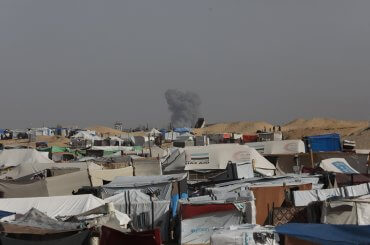Wednesday evening begins Tisha B’Av, or the Ninth Day of the Hebrew Calender month of Av. This is the saddest day of the year in the Jewish religion. On this day, the First Temple was destroyed by the Babylonians in 586 B.C.E., and the Second Temple was destroyed by the Romans in 70 C.E.. In addition, the Jews were expelled from England in 1290, and the expulsion of Jews from Spain began on this date in 1492.
To commemorate the destruction of the two Temples, Rabbinic leaders designated Tisha B’Av as a full fast day. Similar to Yom Kippur, this is a 25 hour fast from the sunset of the 9th of Av until nightfall of the 10th of Av. Also, people are not allowed to drink liquid, bathe, wear leather shoes, put on makeup or perfume, or have intimate relations. Unlike Yom Kippur, one is permitted to work, although it should not be done if it will district a person from observing the solemn aspects of the day. In addition, customs associated with mourning, such as sitting on low stools and not talking are observed for most of the day.
On the evening of Tisha B’Av, people gather in synagogue, sit silently on the ground, and read the Book of Eikha, or Lamentations, which was written by the prophet Jeremiah after the destruction of the First Temple. The Book of Lamentations consists of five poems that deal with the destruction of the Temple, the collected sins of the Jewish people and the miseries inflicted upon them. It concludes with a prayer for the repenetence of the Jewish people and return to Jerusalem.
Many Jewish sages stated that the Temples were destroyed because of sinat hinam, or causeless hatred. Their lack of concern and compassion led to a destructive disunity among the Jewish people. As a result of this, many Jewish people use Tisha B’Av to reflect on the nature of hatred and tragedy in order to create a more unified existence.
So along with many other Jews, I will communally mourn tomorrow night to reflect on the tragic events of my people, as well as the tragedies that have occured and continue to occur to all peoples. If it is truly meaningful, hopefully, I will have a greater apprecitation for the past and a brighter outlook for the future.
The second reason I will mourn is more personal. On Sunday, my 18 year old cousin will leave America and move to Israel (make aliyah). After a three month stay at a kibbutz acclimating into her new nation, she will be joining the Israeli Defense Force (IDF). She is a beautiful and determined young woman, who decided to make aliyah several years ago.
She, like her parents, has fallen in love with the people and the land of Israel. Like many young people with her feelings, she believes that it is her duty as a Jewish person in the diaspora to put aside her more comfortable life and defend the existence of the State.
I must admit that I have had very mixed feelings about this over the last several years. While I admire and respect her passion and willingness to live her convictions, I wish she had chosen a more peaceful path. Personally, I am troubled by diasporatic Jews taking advantage of the Law Of Return unless they are being persecuted in their homeland. I also have trouble with any child volunteering for a nation’s army, since I do not believe most governments act in the best interests of the sons and daughters who serve it.
Additionally, I have been upset at the Jewish communal worlds that she belongs to. In my opinion, it appears that the Rabbinic and lay leaders within her synagogue, religious Day School, Zionist Summer Camps, and Israel advocacy groups have given her a unbalanced, romantic, Leon Uris-like view of Israel. When she first started talking about moving to Israel, she was much more open minded about all of the peoples of Israel and the Occupied Territories. However, over the last few years, as she has become more involved with these groups, her tolerance of "the other" has decreased. While these leaders may not have openly encouraged her postponing or skipping college, moving to Israel, and joining the IDF, they seem to quietly glorify her decision.
As you can see I am certainly filled with my own personal sinat hinam regarding this loss. As the days approach before she departs, I will need to mourn her loss of innocence and spend time putting aside my selfish hatred and anger. I need to focus on the idea that my cousin is a moral person who has made the right choice for herself, while choosing it of her own accord. If, God willing, I can approach this meaningfully, I will have a greater appreciation for her and her decision, as well as a more positive outlook regarding her future.
For all of my Jewish brothers and sisters who have come to my diaries, whether you have agreed with my ideas or not, I wish you a truly meaningful fast tomorrow evening.
This post originally appeared on Daily Kos.

